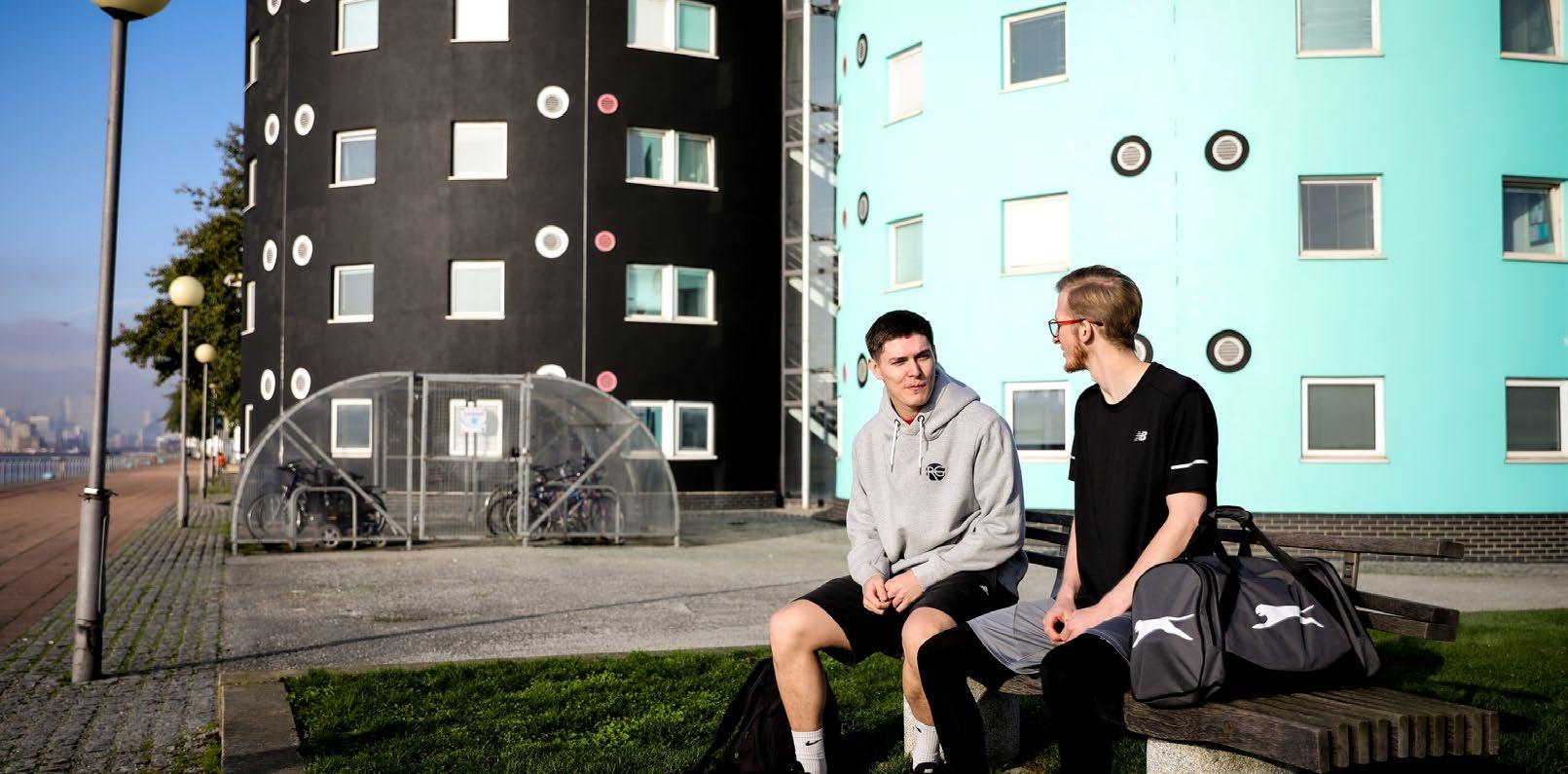STAY SAFE
a guide to personal safety
uel.ac.uk

Living in London and studying at UEL can be one of the most enjoyable and rewarding experiences you ever have! It’s an exciting place and we want you to have good experiences whilst you’re here.

According to the Economist’s Safe Cities Index, London is amongst the safest cities in the world. It’s an incredible location, packed with culture, things to do and opportunities to explore! This short guide provides practical advice on how to enjoy the city whilst staying safe.
The information below will you to be aware of the potential risks around you. Remind yourself of this advice when you go out, and use your common sense to avoid becoming a victim of crime.
How to keep safe when you are out:
- plan where you are going and how you will get there
- if you can, tell someone where you are going and when you will be back
- if you have one, take a personal attack alarm with you; keep it where you can find it easily and make sure you know how to use it
- keep to well-lit streets where possible
- if you can, go out with friends or someone you know
- keep your bag with you at all times
- wear your handbag across your body or under your coat
- do not get into a car with someone you don’t know
- if you take an Uber or similar, check the car and driver match your app
Be aware and keep your possessions safe:
- Do not leave your property unattended on campus and be vigilant to distraction-type theft
- thieves frequently operate at tube stations, cash machines, in car parks, around bus stations and in overcrowded areas, especially during busy times
- be cautious with your money, mobile phone and keys - store them in a safe place like your bag or pocket to reduce the risk of theft
- carry some cash in case you need to make a call from a public phone
You can reduce the risk of decive theft by following these simple tips:
- don’t leave your phone on tables in pubs or restaurants
- when you leave a train or tube station, look at who is around you before you take out your phone
- don’t walk and text at the same time, as you will be less aware of what is happening around you
- keep calls in public places as brief as possible; the longer you talk, the more likely you are to be spotted by a potential thief
- use the barriers available to you - take a call with your back to a wall and hold your phone close to your body when texting or browsing
- try not to carry your laptop in a separate case, carry it in your rucksack instead where it can blend into your books
- high value items such as laptops, iPads and phones when left unattended do go missing

Safety in halls of residence:

For students living on campus:
- never let anyone enter the building after you (tailgate) through the main front door – they should use their own access ID card to swipe-in to the building
- always lock your bedroom door when you are not in your room and don’t wedge any doors in halls open
- close your windows whenever you are not in your room
- keep your keys and ID with you at all times and don’t give your bedroom keys to anyone else
If you see anything suspicious, call Security on +44 (0) 208 223 5599 (5599 from your bedroom phone) or leave an anonymous message on the Silent Witness Number (+44 (0) 20 8223 5799).
How to keep safe at a cash machine (ATM):
be aware of who is around you when using the cash machine – make sure nobody is standing too close to you
- if you can, use a cash machine during the day; if you need to use one at night, find one in a brightly lit area or inside a bank
- only carry enough cash for what you need
- separate your cash - keep some in your wallet or purse and some in your pocket to reduce the risk of a thief pick-pocketing you
- do not show or give your bank PIN to anyone; try to remember your PIN and do not write it down
Safety when using transport
Trains:
- find out the times of the trains, so you do not have to wait too long and you know when the last train is running – train schedules can be found at www.nationalrail.co.uk or www.tfl.gov.uk
- if you are waiting on a platform, wait near the ticket office or in a brightly lit area
- if you can, sit in a busy carriage – it is safer where there are more people
- if someone bothers you, get up and move away.
Buses:
- find out the times of the bus you want so you do not have to wait too long
- you can get live information about bus arrival times at www.countdown.tfl.gov.uk
- if you can, sit near the driver
- tell the driver if someone is bothering you
Taxis:
- if making your journey by taxi, book your journey through a licensed operator or use a hackney carriage
- if pre-booking using Uber (or equivalent), check the driver and vehicle match the information in your app when the taxi arrives
- unless the vehicle is a licensed hackney carriage, never get into a taxi that just stops in the street
- if you can, it is safer to sit in the seat behind the driver
- be prepared for the end of your journey before you enter the vehicle make sure you have your house keys and money to pay for the ride
- ask the taxi driver to park outside until you get into your house in case you cannot get in and need to travel to somewhere else
Cars
Maintenance:
- make sure that your car is kept in good running order – do not put yourself at risk by running out of oil, petrol, water or air in the tyres
- take the time to learn the basics of car maintenance and have your car serviced by a reputable garage
- consider joining a breakdown organisation as added security (e.g. AA, RAC), and carry details of your breakdown cover with you in the car
Driving:
- plan your journey carefully – know what route you are taking and let other people know where you are going and when you hope to arrive
- use a map or sat nav, so you don’t have to stop and ask for directions
- store a small amount of cash in the car in case you need to buy food or use a pay phone in an emergency
- do not pick-up passengers you do not know (e.g. hitchhikers)
- never leave your keys in the ignition whilst you are out of the car for any reason
- if you feel threatened by another driver, make a note of the type of car and its registration number when safe to do so
- if you break down on a motorway, it is safer to wait for assistance outside your vehicle, standing on the verge or behind the crash barrier; take your keys with you and lock all doors except the one nearest to you
- if you think another vehicle is following you, keep driving until you come to a busy location such as a garage or motorway services; if you are really worried, drive straight to the nearest police station
Parking your car:

- avoid using poorly lit car parks; whenever possible, park as close as you can to the attendant if there is one
- reverse into the space and hide all valuables
- shut all windows and lock all doors; note the location of where you have parked your car
- when returning to your car, have your keys ready so that you can get in quickly
- before entering, scan the back seat to check no-one has climbed in
- once you are in the car, lock the doors immediately
Alcohol and Drugs

Besides damaging your health, heavy consumption of alcohol over a short period of time can seriously impair your judgement so you are more likely to take risks you may not have taken while sober
- Try to drink responsibly, drink water between alcoholic drinks and take some fresh air if you feel unwell
- When drinking, look out for each other. If you see you friend or fellow classmate has drunk too much, offer them some assistance or let a member of staff or security know
- Report threats or violence to the bar staff or security
Drink spiking
Drink spiking is when a mind-altering substance is put into your drink without your knowledge. Drink spiking is illegal even if an attack or assault has not been carried out. Often the assailant’s purpose is to commit sexual offences or theft against the victim.
There are a number of drugs known as ‘date rape’ drugs which can result in total loss of memory and loss of control over your body.
Rohypnol has gained notoriety as ‘the date rape drug’. It takes effect very quickly and reaches its peak eight hours later when it can cause unconsciousness. Rohypnol comes in the form of a tasteless and odourless pill which is easily ground down into a powder, and all traces of the drug disappears after 24 hours.
Tips to prevent this from happening:
-
- Do not leave your drink unattended at any time
- Never accept a drink from anyone you do not know or trust
- Do not share or exchange drinks, or drink leftover drinks
- Drink from a bottle rather than a glass when possible
When you are walking around in a club or bar keep your hand over the opening of your drink
Sexual Violence
Things that might stop you from being able to give consent:
- Being drunk or under the influence of drugs
- Being unconscious or asleep
- Being underage – legal age of consent is 16
- Health or mental health problems or disabilities that limit your choices at the time
If you are a victim of crime off campus:
- In an emergency you should phone 999. You should use this service if a crime or incident is happening, or if anyone is in immediate danger.
If you are deaf, deafened, hard of hearing or have a speech impairment, a text phone is available on 18000
- Dial 101 for incidents not requiring an immediate police response. If you are deaf, deafened, hard of hearing or have a speech impairment, a text phone is available on 18001 101
- In non-emergency situations you can also report a crime or incident at any Police station.
- Crime can reported online, as long as an urgent response is not required: Report | Metropolitan Police
If you are a victim of crime on campus:
- crime or incident is happening or if anyone is in immediate danger. If you are deaf, deafened, hard of hearing or have a speech impairment, a text phone is available on 18000
- Please advise Security as soon as possible that you have called the Emergency Services. We will be able to assist. Call UEL’s emergency number extension 7771 from a campus landline or +44 (0) 20 8223 7771.
For incidents not requiring an immediate Police response:
- Report the crime to campus Security, at the earliest opportunity
- Security will dial the appropriate police telephone number for you and hand you the telephone so you can report the crime directly to the police (only victims of crime can report crimes to the police).
- In cases of stolen items, Security will ask you to complete a Loss Report Form. This will assist with reuniting stolen property to the rightful owner
Our Report and Support service provides information and resources around various forms of harassment and abuse. A reporting function is also available for both anonymous reports and advisor requests. More information about each type of report can be found by clicking on the report links or via the Report tab on the site: https://reportandsupport.uel.ac.uk
If you have experienced or witnessed, any form of violence or harassment and you want to report this to UEL, please contact our Independent Sexual & Domestic Violence Advisor.
If you would prefer to seek support from a source outside the university, these are a few places you can go to:
- Rape Crisis, female survivors of rape and sexual abuse Contact Rape Crisis England & Wales | Rape Crisis England & Wales
- Survivors UK, male survivors of rape and sexual abuse SurvivorsUK | We challenge the silence to support sexually abused men
- The Havens, health and medical support for survivors of sexual violence in London
The Havens
- London Survivors Gateway Looking for support after sexual violence? (survivorsgateway.london)
- Galop, LGBTQ+ survivors of domestic and sexual violence Galop - the LGBT+ anti-abuse charity
Useful websites
Metropolitan police - Home | Metropolitan Police
British Transport Police - Home | British Transport Police (btp.police.uk)
Property register - Search for land and property information
GOV.UK (www.gov.uk)
Transport for London - Keeping London moving Transport for London (tfl.gov.uk)
Useful apps
- London Transport Live
- Citymapper
- Kabbee
- Uber
- First Aid by British Red Cross
- On the NHS website you will find plenty of recommended health and fitness apps too!
© University of East London









